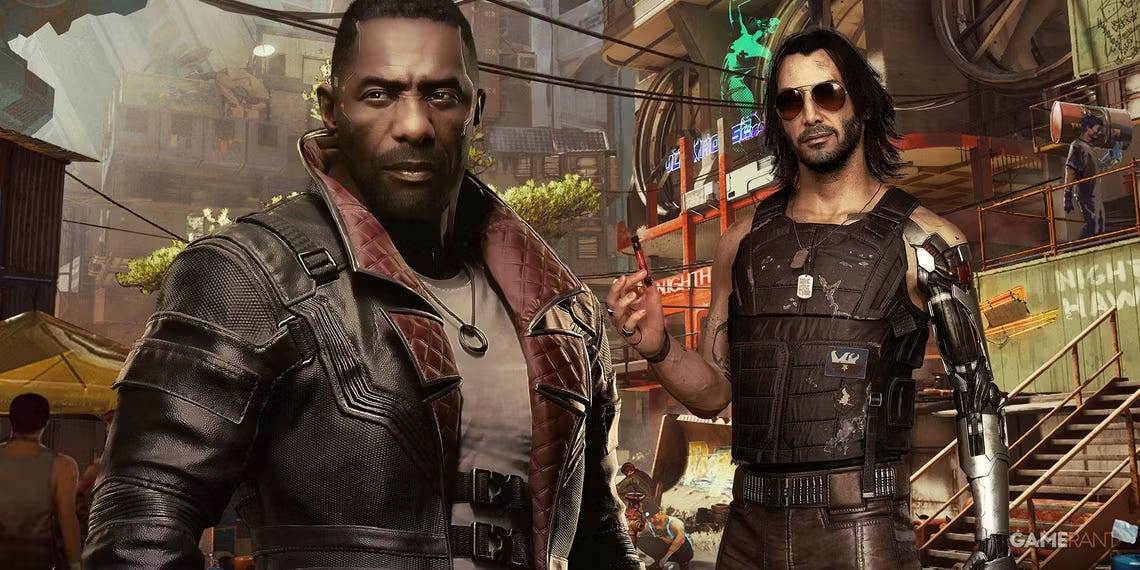How Cyberpunk 2077 Perfected the Use of Celebrity Talent for Cinematic Gaming
A look at how Cyberpunk 2077's handling of big-name actors sets a new standard for future narrative-driven games
Despite its troubled launch, Cyberpunk 2077 has managed to climb from the depths of criticism to win over many fans, thanks in part to a series of impactful updates and the standout Phantom Liberty DLC in 2023. While technical issues marred its release, there was no doubt that the game's narrative and characters were its true strengths. One area where Cyberpunk 2077 shone was in its innovative use of celebrity talent, an element that enhanced its cinematic storytelling. As the industry moves toward more narrative-driven experiences, future games can learn from how Cyberpunk 2077 successfully balanced star power with story immersion.
Celebrity Talent in Cyberpunk 2077: Raising the Bar
When Cyberpunk 2077 was first announced, it generated immense excitement, which only intensified when Keanu Reeves took the stage at E3 2019 to announce his involvement. The announcement set a high bar for the game, and while it struggled at launch, it’s safe to say that Reeves' presence as Johnny Silverhand was a highlight that fans could rally behind. Reeves brought a fresh take to Johnny, combining his public persona with new characteristics, allowing the character to stand out while still feeling authentic. Instead of simply playing a version of himself, Reeves brought depth to the role, which made Johnny's interactions in the game feel natural and emotionally resonant.
The Phantom Liberty DLC saw another high-profile addition with Idris Elba’s portrayal of Solomon Reed, an agent with a cold, calculating edge. Much like Reeves, Elba didn’t let his star power overwhelm the character. His nuanced performance contributed significantly to the narrative’s spy-thriller atmosphere, adding layers to the storyline without distracting from it. The key takeaway here is that Cyberpunk 2077 utilized its celebrity talent to serve the story, rather than relying on their presence for sheer spectacle.
The Challenge of Celebrity Talent in Cinematic Games
Incorporating big-name stars into games is a fine balance. Developers must avoid the temptation to make the actors’ personalities overshadow the story or break immersion. This is a common pitfall for cinematic-focused studios, who often struggle with celebrity casting. While Cyberpunk 2077 navigated this with grace, other developers may find this a challenging hurdle to clear when integrating high-profile talent into their own narrative-driven games.
Studios to Watch: Following Cyberpunk 2077’s Lead
Several notable studios are known for their cinematic, story-driven games, and they could stand to learn from how Cyberpunk 2077 seamlessly incorporated celebrity talent:
Naughty Dog – Known for games like The Last of Us series, which often incorporates highly emotional, story-driven narratives, Naughty Dog could learn from Cyberpunk 2077 in terms of balancing performance with story immersion when working with notable actors.
Santa Monica Studio – With the God of War series, Santa Monica has consistently delivered emotionally charged, character-driven narratives. Future games could benefit from focusing on how celebrity talent enhances a character’s depth rather than overshadowing it.
Hideo Kojima/Kojima Productions – Kojima is no stranger to casting well-known actors like Norman Reedus and Mads Mikkelsen. Cyberpunk 2077 could provide a useful example of how to integrate big names without letting them dominate the storytelling.
Quantic Dream – With narrative-driven games like Heavy Rain and Detroit: Become Human, Quantic Dream has successfully worked with actors before, but they could refine their approach further, taking notes from Cyberpunk 2077 on how to balance performance and plot.
Supermassive Games – Known for their cinematic horror games like Until Dawn and The Dark Pictures Anthology, Supermassive could refine their celebrity casting approach, ensuring that the presence of familiar faces enhances, rather than detracts from, the story.
Each of these studios places a strong emphasis on cinematic realism and storytelling, often with a focus on character development. However, none have quite reached the same level of balance between story, writing, and celebrity talent that Cyberpunk 2077 achieved. Future games could benefit from studying how Cyberpunk 2077 used its star power not just as a gimmick, but as a means to enhance the narrative and deepen the emotional impact.
Conclusion: Setting a New Standard for Celebrity Talent in Gaming
Cyberpunk 2077 stands as a shining example of how to integrate high-profile celebrity talent into a cinematic game. Its seamless incorporation of Keanu Reeves and Idris Elba into the world of Cyberpunk elevated the story without detracting from it. Future narrative-driven games can look to Cyberpunk 2077 as a blueprint for how to balance star power with storytelling, ensuring that celebrities enhance the experience rather than overpower it. As the industry continues to prioritize cinematic experiences, mastering the art of celebrity casting will be key to creating truly immersive and unforgettable games.


